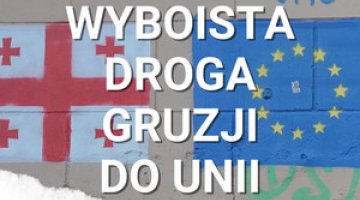Georgia: Georgian Dream consolidates its anti-Western and authoritarian rule
On 15–16 April, Georgian President Mikheil Kavelashvili, whose authority is not recognised by the opposition, visited Azerbaijan on his first foreign trip as head of state. This choice reflects the close ties between the two countries, which together form a latitudinal ‘bridge’ for the key Caucasus transport routes, as well as the development path chosen by the Georgian government. While Georgia formally remains a candidate for EU membership, in practice it is increasingly distancing itself from Brussels.
The Georgian government has taken several steps that have brought the country closer to Russia. In recent weeks, despite protests from the EU and several of its member states, the Georgian parliament passed another package of laws restricting the activities of non-governmental organisations and the media, while increasing state control over them. The government has stood its ground in the face of daily demonstrations that have been taking place since last autumn in Tbilisi and other cities, with protesters calling for a rerun of the parliamentary elections and for Georgia to remain on its European path. However, the weak and fragmented opposition has been unable to harness public discontent or devise a coherent strategy for action. This also applies to its symbolic unifying figure, former president Salome Zourabichvili. The ruling Georgian Dream party has openly declared that its aim is to eliminate its opponents, particularly the United National Movement (UNM). To this end, it has established a parliamentary commission to investigate allegations that the UNM engaged in unlawful activity during its rule from 2003 to 2012. This is intended to provide grounds for banning the party and other ideologically aligned factions. All indications suggest that this will occur following the local elections scheduled for October this year.
Leaderless protests
The current phase of Georgia’s political crisis, ongoing for at least four years since the previous electoral cycle, began after the parliamentary elections held on 26 October 2024, which the opposition and then-President Zourabichvili denounced as rigged (see ‘The fourth term of Georgian Dream: a questionable victory’). Protests erupted shortly afterwards and intensified following Prime Minister Irakli Kobakhidze’s announcement on 28 November that Georgia would postpone its EU accession process until 2028 (see ‘Georgia is suspending its EU integration process’). The demonstrations have continued ever since, gaining momentum on significant anniversaries such as 9 April (marking the Soviet army’s violent crackdown on a pro-independence rally in 1989) and on public holidays. The protesters’ principal demand is that the parliamentary elections be repeated under international supervision. They are also calling for the release of individuals detained in connection with the protests. Virtually every night, crowds ranging from several hundred to several thousand people (occasionally tens of thousands) have been gathering to block Rustaveli Avenue in central Tbilisi, demonstrating determination and considerable courage. The protesters risk heavy fines for damaging public property and disrupting traffic; they have also faced repeated violence from so-called titushky (provocateurs) and members of the security forces. The Ombudsman’s 2024 report noted that not a single criminal case had been opened against the latter, even in clear instances of excessive use of force.
The demonstrations have emerged as a grassroots, non-partisan, network-based movement with no central coordinating body. To date, no clear leader or leadership group has emerged, making it difficult for the government to defuse the protests, but also leaving the demonstrators without formal representation. This wave of civic activism contrasts sharply with the inertia of the pro-Western opposition parties, which have resigned their parliamentary seats in protest, yet failed to present any coherent strategy for action. This also applies to Salome Zourabichvili, who has emerged as the natural leader of this fragmented camp, represented by three opposition blocs and one party which entered Parliament. The former President’s activity is largely confined to appearances at various forums abroad, primarily in the West. Within Georgia, she has attempted to coordinate opposition efforts: for example, on 31 March she launched a ‘platform of resistance’ aimed at bringing together interested groups. The pro-Western opposition still recognises her as the legitimate head of state, while the electoral college, dominated by Georgian Dream, elected Mikheil Kavelashvili as the new president on 14 December (see ‘Georgia: presidential election amidst intense protests’).
A ‘Nuremberg Trial’ for the opposition
Despite street protests and a negative assessment from the EU, in recent weeks the Georgian parliament has passed or amended another package of laws expanding state control over civil society institutions and the media, officially to increase transparency in their operations. The new legislation includes the Foreign Agents Registration Act, which replaced last year’s law ‘on transparency of foreign influence’ (see ‘Georgia: the veto of the ‘law on agents’ is rejected’). The law ‘on radio and television’ prohibits both direct and indirect foreign funding of broadcasters; similar restrictions on online media are expected to follow. The law ‘on grants’ introduces a requirement to obtain government approval before accepting foreign funding, although certain exceptions apply, such as grants for study abroad. Moreover, consultations with non-governmental organisations have been removed from decision-making processes within state institutions, while the Criminal Code has been amended to reintroduce the offence of treason, now encompassing acts such as undermining the country’s defence capabilities and compromising its external security. The new regulations have drawn strong criticism from the EU, several of its member states, and international bodies such as the OSCE and ODIHR (in case of the Foreign Agents Registration Act).
For now, parliament has postponed work on proposed legislation that would make it more difficult to register new political parties. The draft law would allow the Constitutional Court to ban organisations whose ‘declared objectives, nature of activity and membership’ correspond to the profile of parties that have already been outlawed. There is little doubt that the goal is to permanently remove from public life the pro-Western opposition movements rooted in or linked to the UNM, which was founded by former President Mikheil Saakashvili and remains the leading force on this side of the political spectrum. Saakashvili has been imprisoned for more than three years; in March, he was convicted for the fourth time, receiving a four-and-a-half-year sentence for illegally crossing the state border. Leaders of the ruling party have justified the delay by citing the need to complete the work of the parliamentary commission investigating the UNM’s time in power, particularly the circumstances surrounding the 2008 Russian-Georgian war. Its mandate also covers the subsequent activities of UNM politicians, including Saakashvili. The commission, almost openly referred to by Georgian Dream officials as a ‘Nuremberg Trial’, is highly likely to recommend banning the UNM and parties founded by its former members. It appears that the ruling party intends to act decisively against the opposition only after the local elections scheduled for October – a delay stemming from concerns that protests could intensify if pro-Western parties are barred from participating; indeed, many of those parties are considering boycotting the vote.
Under Western (and Eastern) eyes
In practice, Georgia is drifting away from the European Union, despite the fact that the pursuit of EU and NATO membership is enshrined in its constitution, and that in December 2023 it was granted official EU candidate status. In the summer of 2024, in response to its increasingly anti-Western trajectory, countries such as Germany and France – as well as the EU as a whole and the United States – announced major cutbacks to assistance programmes for Georgia and downgraded their relations with it (see ‘Gruzja: zaostrzenie kryzysu w relacjach z Zachodem’). Currently, around 200 Georgian officials, including Georgian Dream politicians and members of the security services, are subject to sanctions imposed by individual countries, including visa restrictions. The so-called ‘nuclear option’ would involve revoking Georgia’s EU candidate status and/or reintroducing visa requirements for short-term visits by Georgian citizens to the Schengen Area. The government in Tbilisi would almost certainly exploit such measures for propaganda purposes, portraying them as punishment for the country’s independence and commitment to conservative values. Georgian Dream remains the most popular single political force in Georgia, while recent polls indicate that public support for the country’s EU membership remains at around 80 per cent.
The consolidation of Georgian Dream’s power and the party’s continued capture of state institutions is, whether intentional or not, bringing Georgia closer to Russia and indirectly to China, a country with which it has signed a strategic partnership agreement. There are currently no indications that the Georgian government might seek to restore diplomatic relations with Russia, as its recognition of Abkhazia and South Ossetia remains a major obstacle. However, positive remarks by Russian officials, including Foreign Minister Sergei Lavrov, regarding the direction of political change in Georgia suggest a desire to rebuild ties. Even at this stage, Georgia’s anti-Western shift appears increasingly irreversible.



